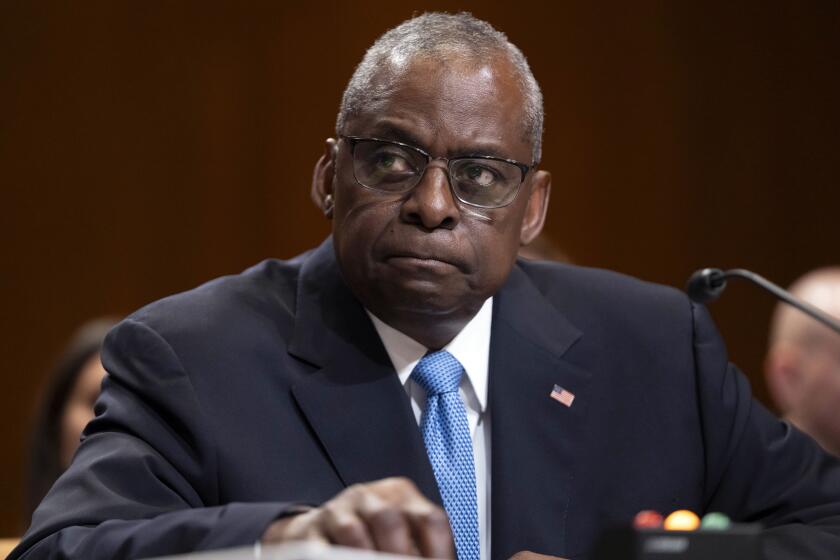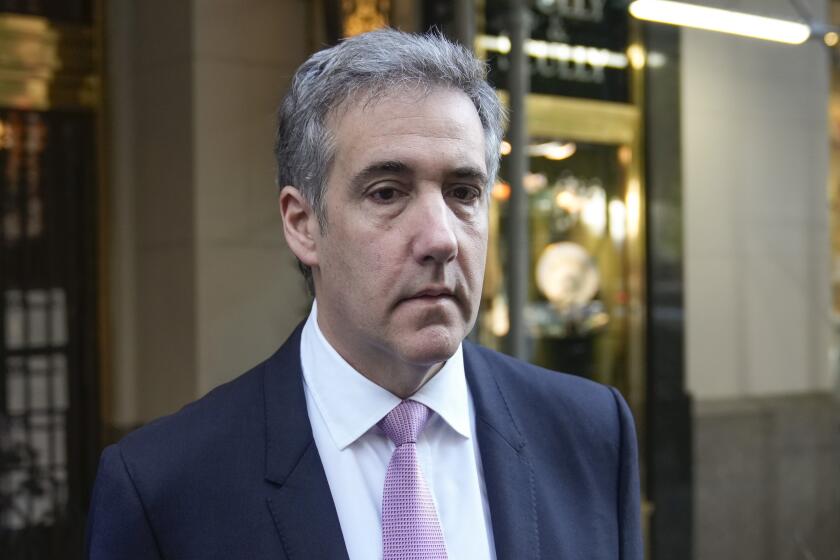Riordan Shrewd to Use Mediator in Chief’s Dispute
Mayor Richard Riordan’s painstakingly pieced-together effort to use a neutral third party to broker an early departure for lame duck Police Chief Willie L. Williams could end in political victory.
But only if the mayor can find eight members of a fractious City Council willing to agree with his mediator.
As some of those members now recognize, Riordan’s recruitment of retired Superior Court Presiding Judge Richard J. “Skip” Byrne to mediate negotiations between lawyers for the chief and the Police Commission represents a shrewd riposte to the council. Earlier this month, it voted to deny Williams a severance package allowing him to leave before his term expires in July. At the time, many lawmakers openly said that Riordan ought to be made to endure any flak from the public over the cost of inducing the chief to go quietly. The council still must approve a severance deal, but this time the proposal will arrive on its doorstep with the endorsement not only of the mayor, but also of a respected neutral party.
“It’s a hot potato, isn’t it?” mused Councilwoman Laura Chick. “It certainly seems like one of those curveballs--no, it’s a boomerang. We made a decision, and it certainly seems as though it’s going to be coming back.”
After the April 2 vote in which council members said no severance was necessary but invited the mayor or Police Commission to offer a different recommendation, Riordan--a former venture capitalist who describes himself as a “problem solver”--tried to negotiate a deal himself. He met with a group of prominent African Americans, including county Supervisor Yvonne Brathwaite Burke, the Rev. Cecil “Chip” Murray of the politically influential First African Methodist Episcopal Church and John Mack of the Urban League, who assured the mayor they “had confidence” in his ability to work out an equitable deal, according to one participant.
But after several conversations with Williams’ lawyers, Riordan decided he carried too much political baggage to make headway.
“The chief’s lawyers are impossible. It’s hard to even talk to these guys,” said one source familiar with the situation who spoke on the condition of anonymity. “The mayor felt [mediation] would be a very productive way to move forward.”
While still in the midst of his reelection campaign, Riordan began a personal search to recruit a suitable mediator. At the top of his list was former U.S. Secretary of State Warren Christopher, who headed the commission that drafted a plan for civilian control of the LAPD and its chief. Christopher reluctantly agreed, but Williams’ lawyers rejected the former diplomat, sources say, because he had publicly endorsed “the process” through which the Police Commission decided not to give Williams a second five-year contract.
The chief’s attorneys, Peter I. Ostroff and Johnny Darnell Griggs, also turned down Riordan’s second choice, nationally prominent civil litigator Ron Olsen. Ostroff and Griggs provided their own list of potential mediators, all of which were rejected by the mayor, sources say.
The mayor “felt Williams’ people were insisting on a private-style mediation,” said a source familiar with his thinking on the matter. Riordan, the source said, “told them that this deal is 90% politics and we need somebody to mediate who understands the art of the possible.”
All parties agreed to Byrne at a meeting last Friday.
The retired judge belongs to a California judicial dynasty with half a dozen family members who have sat on various benches. He is well-known and widely praised by attorneys and local politicians alike.
“Skip Byrne always has been held in the highest esteem by both his peers and the attorneys who appeared before him for his fairness and scholarship,” said defense attorney Gerald L. Chaleff, a past president of the County Bar Assn. and a Riordan appointee to the city Planning Commission. “I don’t know anyone who would not agree that he is the perfect choice to mediate this dispute.”
The onetime presiding judge, who is working pro bono, started Sunday afternoon with a three-hour session at Ostroff’s home. Despite a previously scheduled arbitration lasting until 4 p.m. each day, Byrne also met with lawyers for both sides Monday and Tuesday evenings.
The mediation is nonbinding, and the city’s attorneys have no authorization to offer any settlement. Rather, Byrne can make suggestions to Riordan, who can then proffer them to the City Council, which must approve any payout.
“I will make a recommendation to the council on a settlement. Skip’s job is to figure out what’s fair,” the mayor said in a telephone interview this week from his Idaho vacation home. “Whatever I suggest, I’m going to take shots. But I’m willing to live with that.”
Lawmakers already have begun taking aim.
Council members Joel Wachs and Rita Walters--who stand at opposite ends of the spectrum regarding the chief, with Wachs vowing to pay the chief nothing more than the salary and Walters among the loudest voices for a large settlement--both said they were annoyed to learn about the mayor’s latest move from the newspaper.
“Nobody knew he was doing this. The process may irritate a lot of people,” Walters said. “The mayor has appointed someone, one more time, to take on a job that he as the mayor should have performed.”
In fact, knowledgeable sources say that the mayor consulted with City Council President John Ferraro and Councilwoman Jackie Goldberg regarding the mediation, and that Byrne and Police Commission President Raymond C. Fisher will probably talk to additional council members as the process unfolds.
After several closed-door discussions of the Williams issue over the past month, the council was hopelessly split into three camps. About five members insisted on paying the chief nothing beyond his salary. About five others backed a deal that would give the chief $370,000 to $450,000--including compensation for the loss in value to his San Fernando Valley home, among other things--on the condition he not sue the city. The remainder were willing to pay the chief only $172,202, the equivalent of one year’s salary, in a nominal arrangement that would keep him as a consultant to the LAPD to ensure a smooth transition.
What brought lawmakers to consensus, sources say, was their collective anger at Riordan, who simply promised to support whatever settlement the council arranged.
“People wanted to know what the mayor thought and what the commission thought,” Goldberg recalled. “We didn’t decide not to hire him. A majority of members said, if we’re going to approve a severance, then by God, the mayor and the Police Commission better be part of that.”
There remains little agreement, however, when it comes to numbers.
Ostroff refused to disclose even a ballpark figure to which Williams would agree. Ferraro said that the chief is looking for $750,000 to $850,000, but that he and others think $100,000 to $200,000 is more appropriate. Mack said $500,000 should be considered “a floor, not a ceiling.”
“What the chief is expecting and wants is something I don’t think you could get agreement on,” Ferraro said. “I told him, ‘Chief, we’ll just keep you on the job. It’s cheaper.’ ”
Indeed, Wachs and councilmen Hal Bernson and Mike Feuer all said this week that Byrne’s involvement was unlikely to move them from their position opposing any payment beyond the chief’s salary through July 6.
“If the door is open for me, it’s only open a crack,” Feuer said.
“We’ll see if we have eight votes here--I’m not going to be one of them,” said Bernson, who is normally one of Riordan’s most consistent supporters. “It’s not going to change my opinion. . . . He’s served his contract. He’s free to go. There’s no obligation.”
Many at City Hall believe Riordan’s involvement, and Byrne’s, will help forge the elusive coalition among council members. For one thing, according to a source familiar with the mayor’s thinking on the issue, Riordan will not propose any settlement unless he is assured in advance that the requisite eight council members will vote for it.
If the chief signs on to a Byrne-brokered agreement, his supporters will be hard-pressed to reject it, even if it is smaller than they’d hoped. The mayor can swing a couple of votes to his side on virtually any endeavor. Add those to the group that was already willing to offer a year’s pay, plus one or two who are frustrated by mounting legal fees as the situation drags out, and the magic number of eight votes seems within reach.
Especially if any heat from the public can be spread throughout City Hall.
“This is a way, politically, for none of them to bite the bullet,” observed Larry Feldman, a prominent civil litigator with long experience in mediation. “It’s a quick way to do it and a way where no one has to accept the responsibility.”
Times City/County Bureau Chief Tim Rutten contributed to this story.
More to Read
Get the L.A. Times Politics newsletter
Deeply reported insights into legislation, politics and policy from Sacramento, Washington and beyond. In your inbox three times per week.
You may occasionally receive promotional content from the Los Angeles Times.






